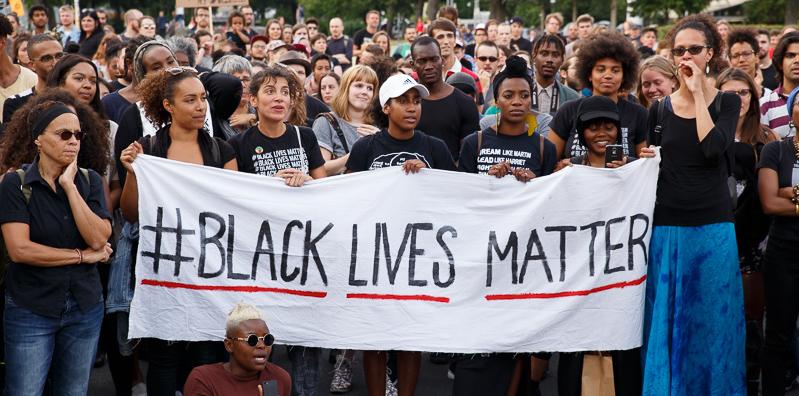Alicia Garza, the co-creator of #BlackLivesMatter (BLM) and Black Lives Matter Global Network, discussed the history and victories of the BLM movement as well as the need to continue making progress in amplifying Black voices and leadership while speaking to students on campus.
At the Nov. 1 event, Garza discussed the role of BLM historically and presently with Rosemary Ndubuizu, an assistant professor of African American studies at Georgetown. The Georgetown University Lecture Fund hosted the event, and the department of African American studies, Justice and Peace Studies Program and Culture & Politics Program sponsored it.
Garza said the BLM movement represents the empowerment of Black voices and leadership.
“When I think about my parents, I know my mother never thought that she would see a Black president in her lifetime,” Garza said at the event. “My mother never thought that we would be having an international dialogue about state violence, police violence and police brutality. Even saying ‘Black’ was not something that was done.”
“It’s easy for us to get nihilistic,” Garza said. “The reality is that BLM, the movement, is one of the most consequential social movements of our time.”
Garza said she thinks the BLM movement helped elevate discussions of race to national levels, shedding light on the systemic racism Black people and other people of color experience.
Garza said she sees the movement as a way to enable people to enact social change where they are, referencing a direct message she received from a professor in Indiana who wanted to create a BLM curriculum.
Elizabeth Foster (CAS ’27) said she attended the discussion to learn more about BLM’s role in social movements and the strategies employed for enacting social change, such as the goal to gauge politicians’ thoughts about BLM.
“The way Garza talked about the strategizing and the movement being less directly politically focused made it unique and more successful in certain ways,” Foster told The Hoya.
Garza said equitable voting access and voting rights are among the top issues the BLM movement seeks to promote.
“They want us to not participate,” Garza said, referring to conservative elected officials. “They’re making voting harder and harder and harder. That ideology wants to have state power: to run the courts, to run Congress, to run the White House. It’s close, but we can stop that through voting.”

According to Garza, political attempts to limit Black voices in voting access include strict voter ID laws and changes in the ability to vote, referencing the inability to give water or food to voters as they wait in line. Garza also discussed racial gerrymandering as politicians’ attempts to limit voices in communities that may not support that politician’s goals.
Garza said she entered social justice work because she wanted to correct the issues marginalized communities face.
“I came into organizing movements and social change work because I was mad and wanted something to be different because I was also hopeful,” Garza said. “My goal is to shift our conditions for the better.”
Kumail Zaidi (SFS ’24), the Lecture Fund’s vice chair of diversity, equity and inclusion and the primary organizer of the event, said Garza’s message was crucial in a turbulent world.
“She had, I think, a very important message about what hope means in politics, why hope is something that is important to maintain and how exactly, in a world where we’re bombarded by a lot of different threats, things that demand our attention at every moment, what it is like to organize a global movement,” Zaidi told The Hoya. “People there seemed to be very touched by her and what she had to say.”
Creating and working with movements about social change requires staying optimistic while taking action, according to Garza.
“Movements should be joyful,” Garza said. “With that being said, it doesn’t mean that everything is supposed to feel good all of the time. There’s a difference between acknowledging that we have joy in our lives at the same time that there are really ugly things happening that are despicable.”
“This work is hard, and that’s why we need joy,” Garza added.




















